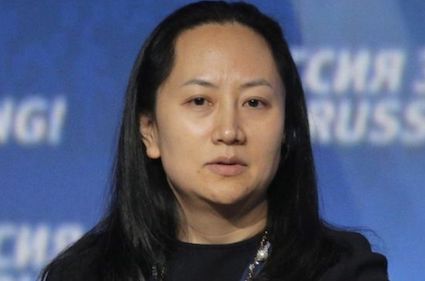Huawei CFO arrest ‘violates human rights’, China says

China has urged the US and Canada to “clarify” the arrest of Meng Wanzhou, Huawei’s chief financial officer.
(BBC) – The daughter of the founder of the Chinese telecoms giant was arrested in Vancouver on 1 December and could face extradition to the US.
Details of the arrest have not been released but the US has been investigating Huawei over possible violation of sanctions against Iran.
China demanded her release, saying her detention was possibly a rights abuse.
Huawei is one of the largest telecommunications equipment and services providers in the world, recently passing Apple to become the second-biggest smartphone maker after Samsung.
Ms Meng has sought a publication ban on the details of the arrest, which has been granted by the courts. Huawei said it had little information about the charges and was “not aware of any wrongdoing by Ms Meng”.
How has China responded?
A Chinese foreign ministry spokesperson told reporters: “The detention without giving any reason violates a person’s human rights.”
“We have made solemn representations to Canada and the US, demanding that both parties immediately clarify the reasons for the detention, and immediately release the detainee to protect the person’s legal rights. ”
The arrest comes at a sensitive time for US-China relations. The nations are engaged in a trade war that has seen both impose duties of billions of dollars on one another’s goods.
But concerns the arrest would impact the 90-day tariff truce negotiated between the two nations at the G20 have not yet materialised. China announced in a regular press briefing on Thursday that it would “immediately” implement the measures agreed.
It also coincides with moves to restrict the use of Huawei technology in Western countries. The US, Australia and New Zealand have blocked the use of the Chinese firm’s equipment in infrastructure for new faster 5G mobile networks.
What has Canada said?
Canada’s ministry of justice confirmed the date and place of Ms Meng’s arrest and added: “She is sought for extradition by the United States, and a bail hearing has been set for Friday.”
It said it could not say more as Ms Meng had sought a ban on the publication of details and this had been ordered by the courts.
A spokesman for the US justice department in the Eastern District of New York – which Huawei said had brought the charges – declined to comment.
What could be behind it?
US media have reported that Huawei is under investigation for potential violations of US sanctions against Iran.
One report in the New York Times said the US commerce and treasury departments had subpoenaed the firm over suspected violation of sanctions against both Iran and North Korea.
US lawmakers have repeatedly accused the company of being a threat to US national security, arguing that its technology could be used for spying by the Chinese government.
Reacting to the arrest, US Senator Ben Sasse told Associated Press that China was aggressively engaged in undermining US national security interests, often “using private sector entities”.
“Americans are grateful that our Canadian partners have arrested the chief financial officer,” he added.
In a statement, Huawei said it had complied with “all applicable laws and regulations where it operates, including applicable export control and sanction laws and regulations of the UN, US and EU.”![]()
‘Bullying’ tactics
Analysis by BBC Monitoring
Ms Meng’s detention is the most popular topic being discussed on Sina Weibo, China’s equivalent of Twitter, where a story on the subject has had more than 33m hits this morning. Most comments express patriotism toward China and criticise the US and Canada for what they call “low” and “bullying” tactics.
One comment says “They have resorted to such means because they can’t compete with Huawei on the market.”
State media have reported the Chinese embassy in Ottawa criticising the arrest, saying it had voiced “firm opposition and strong protest” against a “serious violation of human rights”.
State news agency Xinhua has quoted Huawei saying it has very little information regarding the charges and is not aware of any wrongdoing by Ms Meng. It added that it “believes the Canadian and US legal systems will ultimately reach a just conclusion”.![]()
Why is Huawei a concern to the West?
Some Western governments fear Beijing will gain access to fifth-generation (5G) mobile and other communications networks through Huawei and expand its spying ability, although the firm insists there is no government control.
Security concerns recently led BT to bar Huawei equipment from the heart of the 5G network it is rolling out in the UK.
New Zealand has blocked Huawei equipment over national security concerns, after Australia imposed a similar ban on both Huawei and fellow communications firm ZTE.
The US has brought a number of legal cases against Chinese technology firms, with accusations such as cyber-security theft and violations of Iran sanctions.
Earlier this year, it barred US companies from exporting to ZTE, effectively shutting down the firm. The US later replaced the ban with a fine and governance changes.
The US has also restricted US firms from selling parts to Chinese chipmaker Fujian Jinhua.
The UK has not blocked firms from using Huawei, although BT, which dominates the UK’s telecoms network, said this week it would not use the Chinese firm’s equipment in its “core” 5G infrastructure.
What are the Iran sanctions?
Donald Trump last month reinstated all the US sanctions on Iran that had been removed under a 2015 nuclear deal.
Mr Trump had been fiercely opposed to the deal, which saw Iran limit its controversial nuclear activities in exchange for sanctions relief.
The re-imposed sanctions hit oil exports, shipping and banks – indeed all core parts of Iran’s economy.
Although there are some waivers, US Treasury Secretary Steven Mnuchin has said the US will “aggressively” target any firm or organisation “evading our sanctions”.

